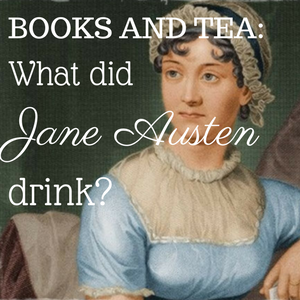
Books and tea go together like peanut butter and jelly, or warm afternoons and sleeping outside in the grass. As such, we’ve decided to run a quick series on famous authors, and the types of tea which they likely drank, starting first and foremost with the queen of the books and tea trope- Jane Austen.
Austen lived from 1775- 1817, in England. She was an extremely important figure in 19th century literature, and a contemporary of the Bröntes. Because of where and when she lived, we can also assume a great deal about what she drank, and how she drank it.
Jane Austen almost certainly drank exclusively black teas. We know this because black teas were designed for export to Europe. Both Chinese and Japanese people tended to consume only green, white, and oolong teas. However, these teas were not hardy enough to stay fresh during the long journey to Europe. Therefore, black tea was the only type of tea which was popular in Europe during the 19th century.
 We also know that the tea which Jane Austen drank was a Chinese black tea. This is because black tea was not successfully grown outside of China until a crop in Assam, India, survived well enough to be exported in 1815, just two years before Austen’s death. Therefore, a standard Chinese black tea such as Keemun Panda is likely to be similar to what Austen drank.
We also know that the tea which Jane Austen drank was a Chinese black tea. This is because black tea was not successfully grown outside of China until a crop in Assam, India, survived well enough to be exported in 1815, just two years before Austen’s death. Therefore, a standard Chinese black tea such as Keemun Panda is likely to be similar to what Austen drank.
 However, it is more likely that Austen drank a tea which came from Southeastern China, simply because this region was closer to the ocean, and therefore easier to export from. Therefore, a Yunnan tea, such as Yunnan Black Needles, or my personal favorite, Yunnan Jig, is a slightly better guess.
However, it is more likely that Austen drank a tea which came from Southeastern China, simply because this region was closer to the ocean, and therefore easier to export from. Therefore, a Yunnan tea, such as Yunnan Black Needles, or my personal favorite, Yunnan Jig, is a slightly better guess.
The most likely tea for Austen to have consumed is actually Lapsang Souchong. This tea has a heavy, smoky flavor, because the leaves are dried faster by being smoked. This tea was designed specifically for export to places which are far away from China, such as England, because it is incredibly hardy. It was also profitable, when demand for Chinese tea increased, because it prevented farmers from having to wait for tea leaves to oxidize in the sun. However, anyone who has ever been in the same room as Lapsang Souchong knows that this tea doesn’t exactly capture the same delicacy the Austen’s writing and persona embodied- it smells like campfire, and tastes like smoke.
Because Austen was British, and Britain has a strong tea culture, we can also say a great deal about how she likely took her tea. English tea was usually drank out of porcelain cups. These were expensive, and also fragile things, and very prone to shattering. This, much of British tea culture revolved around protecting these cups from sudden, drastic temperature changes.
 The cup was likely warmed by being rinsed with hot, but not boiling water, before tea was poured into it. In addition to protecting the cup from shattering, it also helped the tea stay warmer longer. And yes, this also works for modern mugs.
The cup was likely warmed by being rinsed with hot, but not boiling water, before tea was poured into it. In addition to protecting the cup from shattering, it also helped the tea stay warmer longer. And yes, this also works for modern mugs.
Cream was typically added to tea in British tea culture. It was poured into the cup before the tea. This way, when the hot tea reached the cup, the heat would be evenly distributed by cold or room-temperature cream, which also cooled the tea.
Austen-era Britain believed that water had to be brought to a boil, but understood that it should only boil for about 10 seconds, because otherwise it would taste flat. Being brought to a boil was necessary when illness from waterborne bacteria was a concern, but we now recommend bringing water for black tea almost, but not quite to a boil. Boiling the water deoxygenates it, thereby harming the taste. Boiling water can also scald leaves, though this is much less of an issue for black teas than for green, white, or oolongs.
Curious about how your own favorite author likely took their tea? Tell us about it in the comments below, and we’ll make them the subject of a future post!

Wow, she died young! Imagine how much more she could have written if she’d been given the chance! Fascinating topic!